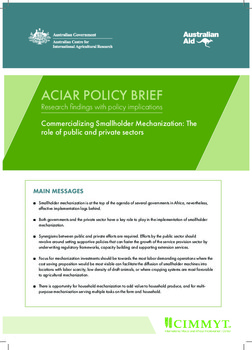Commercializing smallholder mechanization, the role of public and private sectors
Abstract
Smallholder mechanization is part of the recent agricultural transformation agenda that most African countries have embarked on, with the aim of improving agricultural productivity, bringing new farmland into production to feed the increasing population, and creating rural employment for the youth. However, the adoption of mechanization in smallholder agriculture cannot be achieved overnight. Rather, it is a process that involves both the public and the private sector, where governments set proper policies and strategies with medium to long-term goals aimed at transforming the type and level of farm power, and a vibrant private sector takes hold of the business opportunities stimulated by the government policies. Moreover, the private sector has to be able to respond to farmers’ immediate demand for machinery services at affordable prices. In this regard, government contribution in supporting business entities supplying machineries and machinery services to smallholder farmers is critical. The support may include the creation of enabling business environments and technical capacity building programs. A broad national mechanization scheme can start with the most demanded machinery services and gradually, and then a step wise process that takes account of business opportunities for service providers

